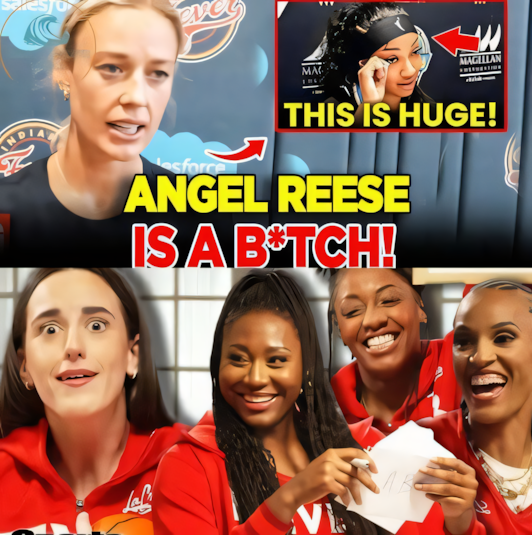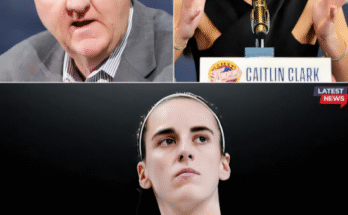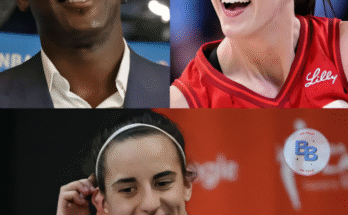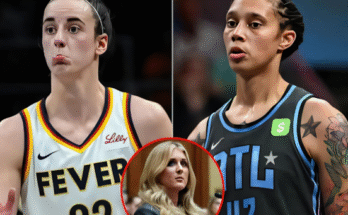In what is shaping up to be one of the most headline-grabbing storylines of the WNBA season, veteran guard-forward Sophie Cunningham has stepped forward to share her thoughts following a heated controversy sparked by rookie Angel Reese’s pointed remarks aimed at fellow newcomer Caitlin Clark. The incident has not only stirred emotions across the fan base but may also signal deeper rifts within the Indiana Fever’s locker room—a team already under a national microscope due to its influx of high-profile talent.
The Moment That Sparked It All
Tensions began to simmer following the Fever’s recent loss, in which Clark, the former Iowa superstar and No. 1 overall draft pick, appeared visibly frustrated on the court. During the postgame press conference, Angel Reese—known for her fiery competitiveness and outspoken nature—made comments that many interpreted as a veiled jab at Clark’s attitude and media portrayal. Without naming names, Reese suggested that certain players were receiving preferential treatment from the media and referees, implying an uneven playing field in terms of scrutiny and accountability.
“Some people get away with things the rest of us never could,” Reese said, her voice steady but laced with unmistakable intensity. “It’s not about hate. It’s just about fairness. That’s all I’ll say on that.”
The cryptic nature of her statement, coupled with her body language, left little doubt among fans and analysts that Clark was the target. Social media exploded within hours, with many accusing Reese of attempting to sow discord or undermine a teammate.
Sophie Cunningham: A Voice of Concern
In the wake of the fallout, Sophie Cunningham—acquired by the Fever in the offseason to bring experience and leadership—finally addressed the growing controversy. Known for her blunt yet thoughtful communication style, Cunningham did not mince words about the potential impact of the drama.
“Look, this team is young. We’ve got passionate players who are still learning how to coexist and compete at this level. But we also have to protect the locker room,” Cunningham said in an exclusive interview. “That means calling things out when they start to go off track.”
While she did not directly criticize Reese or Clark, her comments made it clear that she is concerned about the consequences of letting personal grievances or media narratives fester within the team.
“I’ve been in this league long enough to know how fast things can unravel when you stop communicating, or when egos get in the way,” she added. “We’ve got to find a way to keep this thing together—on and off the court.”
A Team Under the Microscope
The Indiana Fever entered this WNBA season with sky-high expectations, largely due to the arrival of Caitlin Clark. As one of the most dominant college players in recent history, Clark brought a media frenzy with her—interviews, endorsement deals, and televised games have all elevated the Fever to must-watch status. But with that attention has come intense scrutiny.
Angel Reese, who also made her mark in college at LSU and has developed a strong personal brand, is no stranger to public attention herself. Her rivalry with Clark stretches back to their NCAA days, culminating in an emotionally charged national championship game that saw the two exchange on-court gestures that sparked national debate.
While both players have publicly stated they respect one another’s game, their competitive tension has never fully disappeared. Now, with both women on the same professional stage, but on opposing ends of public opinion, the pressure is beginning to show.
Media, Perception, and Pressure
Experts and insiders alike have noted that the situation reflects a larger conversation about race, media bias, and the way young women athletes—especially Black women—are portrayed and judged.
“Angel Reese isn’t just talking about a teammate,” said WNBA analyst Lisa Jefferson. “She’s talking about a system that elevates some voices while minimizing others. That’s a much bigger issue, but when it plays out in a locker room, it can create serious conflict.”
Jefferson noted that Sophie Cunningham’s decision to speak out may be a critical turning point. “She’s trying to be the bridge—the veteran voice. But it’s a delicate role. If not handled carefully, it could either help unify the team or add more fuel to the fire.”
Fallout and Next Steps
The Fever’s coaching staff has reportedly addressed the issue internally, emphasizing unity and the importance of mutual respect. Head Coach Christie Sides declined to comment directly on the remarks made by Reese, but reiterated that team culture is a top priority.
“We’re building something here, and that means everyone has to be committed—not just to winning games, but to lifting each other up,” Sides said during a pre-practice media scrum. “We’ve talked about it. We’ll continue to talk about it. That’s how growth happens.”
Whether the team can rally behind these sentiments remains to be seen. Cunningham’s leadership may play a pivotal role in that outcome. A seasoned professional with playoff experience, her ability to guide young players through adversity will be tested like never before.
Conclusion: A Defining Moment
The storm of emotions, opinions, and expectations swirling around the Fever has created a defining early moment for this team—and perhaps for the league as well. Sophie Cunningham’s calm but candid response reflects the delicate balance required to navigate team dynamics in the era of social media scrutiny and growing cultural awareness.
Both Angel Reese and Caitlin Clark are generational talents, and their futures in the league are undeniably bright. But in order for the Indiana Fever to rise to its full potential, harmony—not just talent—must become its foundation.
Whether this incident becomes a footnote in a championship season or the start of a more significant divide depends largely on what happens next. But for now, one thing is certain: all eyes are on Indiana.



